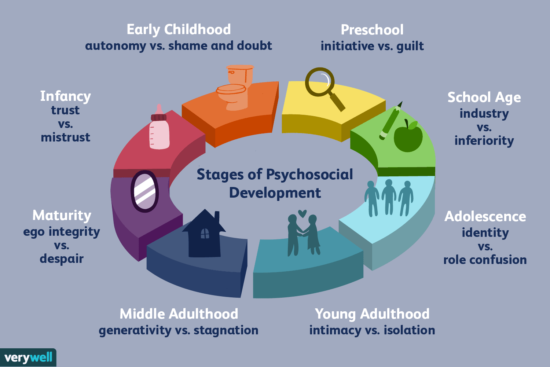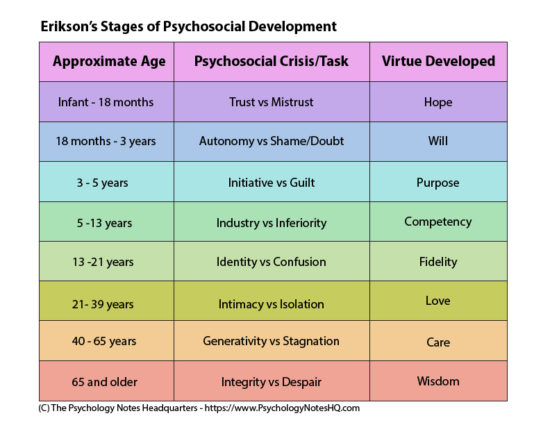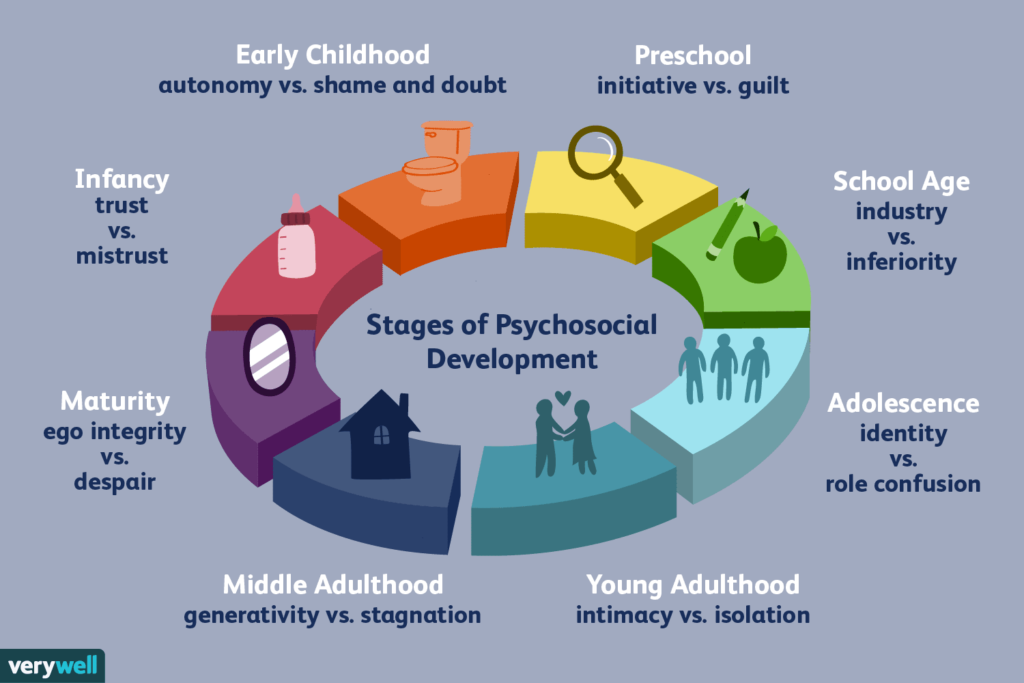When you think in an abstract or general way, you are said to think theoretically. This is a kind of reasoning that is not actually based on science but is somewhat based on some form of theory. Theories try to explain things in a general or abstract way; for example, a generalized explanation of how nature works. The word theory originates from ancient Greece, although it has taken on several related meanings in modern use. Often confused with a hypothesis, a theory is completely different since it offers an explanatory framework for some observation. From the assumption of the explanation, the theory obeys several hypotheses that can be tested in a bid to offer support for, or challenge the theory. In this article, we are first going to define theory and later on explore Erikson’s theory of life stages development.
Definition of a theory
A theory can be defined as the postulation about what ought to be. The theory provides norms, goals, and standards and can be normative or prescriptive. It can also be defined as the body of knowledge that may be distinguishable from particular explanatory models. When you create a theory, you are simply developing this body of knowledge. Theories are, in most cases, contrasted to practice. A theory can also be defined as the supposition or a system of ideas that try to give an explanation of something that is most likely based on general principles independent of the thing that is explained. It is the set of principles on which the practice of an activity is based. You can use a theory to account for an occurrence or to justify your course of action. It contains a wide range of ideas that are linked in a bid to offer explanations for something. It gives the framework for offering explanations for observations made. A theory offers explanations based on assumptions that follow a number of possible hypotheses that can be tested.
In most cases, it is hard to prove the correctness of theory, although it is quite possible to prove it wrong. The major reason for this phenomenon is the fact that no matter how many times you test a theory, there are so many tests that you cannot completely exhaust all of them. Even if a theory has been tested hundreds of times over, there may still be a test that it may fail. In case one of the tests proves it wrong, then the theory can easily be disapproved. However, if the theory passes a test, it will need to be taken through numerous other tests until it is proven wrong! The second reason why theory cannot be proved to be true lies in the fact that no single theory fits all the facts. In the real sense, a theory is just a narrative that explains, which means that it can be told each time differently. We can say that the strength of a theory just depends on how well it is told and the possible number of facts that support that theory. There is always an infinite number of theories that fit facts. For example, when you look at some of Newton’s laws and theories for moving bodies, for example, Force=MassXacceleration, this is a theory that works well for a long period of time but was later replaced by Einstein’s theories. Despite the fact that the theories were correct, but were replaced because of the fact that the new theories explained additional things that the old theories did not. This proves that testing theories can prove them to be ignorant of some facts and therefore make them untrue or prove that they left out some phenomena unexplained.

What makes up a good theory?
In order for a theory to be considered good or effective, it needs to satisfy a few conditions, as explained below.
-
Mechanism
A good theory should have a dynamic element or a sense of movement. This means that for a theory to be good and provide a sense of understanding, it should be able to show how the occurrence of an event leads to another. The theory should not simply give a name to the cause of something but should actually offer a clear explanation as to why certain things happen and what causes them to happen. Just because a theory has a name, it does not mean that it is real or credible. The theory should be able to explain and not just restate and observation. Once you read a good theory, you should be able to understand the reasons that things occur in the way that they do.
-
Generality
A good theory should be general in nature so as to be applicable to an array of situations, events, and individuals. It should always work for a large number of things and should be applicable to a large number of people that may be in a particular situation where the given theory applies. The most important idea of the theory, the mechanism, is that individuals in a similar situation will always face the same results no matter what happens. For example, when individuals do not have time for class as a result of work commitments, they are most likely to lag behind in class. It does not matter the type of work they do or the number of hours that they work.
-
Truth
As we already discussed, a theory can never be proved to be true. This is because tests conducted on a theory are so many, and there is always some form of data that may contradict a theory. Secondly, theories are descriptive in nature, and there are always a significant number of ways to offer descriptions for certain occurrences.
-
Falsifiability
A good theory should be falsifiable. This is because this allows the theory to explain some few hidden elements that may not be visible unless it can be falsified. Theories that fail to be falsifiable indicate that it is impossible to collect data on them and that the theories are circular, which may not be good for any theory.
-
Simplicity
A good theory should be simple and should always avoid posting complex relationships in cases where simpler alternatives can be employed. Nature seems to prefer parsimony, and so theories should be able to break down complex things in order to endure the present. When theories are not simple enough for you to understand, they will simply become useless. Since they are sometimes considered as models, they should always be a smaller and simpler version of the real thing being observed. The theory should pull the important parts and leave behind any extras that are not that important. When you involve too much detail, you obscure the key issues. When a model is very complex, it offers little or no explanation to key issues that are bad in theorizing.
The other key element of a good theory is that it should contain an element of fertility and surprise. Fertile theories are ones that have the ability to generate a tonner of implications in different areas. In the case of surprise, the theory should always be interesting and should generate non-obvious implications.

Erikson’s Theory of Life Stages Development
This is a very interesting theory that was conceptualized by Erik Erikson to explain the various stages of psychosocial development. He argued that personality develops in an order that is pre-set in an order that encompasses eight stages. The stages vary from infancy to adulthood, and during each of the phases, an individual goes through the psychosocial crisis that may impact the personality development either positively or negatively. According to him, the crises are psychosocial in nature owing to the fact that they are comprised of the psychological needs of a person and conflict with the requirements of a given society.
The theory holds that a healthy personality is the result of the successful completion of each of the stages and allows the individual to acquire basic virtues. These basic virtues are the strengths associated with the character through which the ego is enabled to resolve any crises that may arise afterward. When you fail to complete any of the stages, Erikson argues that you will have a reduced ability to complete any further stages, and you will, therefore, develop a weaker personality and lower self-esteem. The stages can, however, be resolved at a later time, although you will need to go through each of the stages successfully. Below are the stages, as mentioned by Erikson.
-
Trust vs. Mistrust
This is considered as the first stage of the theory of psychosocial development. This is a stage that starts when you are born and is said to continue up to when you are approximately 18 years of age. At this stage, the newly born child is not sure about the world into which they are conceived. As a baby, you will, therefore, be forced to look up to your primary caregiver for stability, care, and protection. When as an infant you are subjected to the form of care that is predictable, reliable, and consistent, you build the trust that you will carry with you to other relationships and you will develop a sense of security even in tough times. If the needs are not met, you will develop a sense of suspicion, anxiety, and mistrust. In this way, then you may well not have confidence in the world around you or in your ability to change things.
Erikson further argues that successful completion of this stage will help develop the virtue of hope. When you develop trust, you will be able to develop hope that in times of crisis, there is the possibility that people that you trust in will help you. When you do not get hope, you acquire fear and you will basically not be able to depend on people around you to help you in times of trouble.
-
Autonomy vs. Shame and Doubt
This is the second stage in the theory of life stages of development. According to Erikson, this stage occurs between 18 months to approximately three years of the child’s life. During this stage of psychosocial development, the young ones are said to be focused on acquiring a sense of personal control over physical skills and the sense of independence. When you are successful at this stage of your development, you will acquire the virtue of will. This stage needs a form of encouragement and support as you acquire your independence. You will, therefore, acquire increased levels of confidence and security and an ability to survive in the world.
In case you are criticized and controlled at this phase of development, Erikson argues that you will begin to feel inadequate in your potential to survive thus increasing your dependence on others. This will lead to low self-esteem and a sense of doubt and shame in your abilities. At this phase, as a child, you develop physically and become more mobile. You also discover that you have different skills and abilities for example climbing and playing with toys. This is an illustration of your growth and the sense of independence and autonomy. The theory argues that at this stage, parents should allow their young ones to explore the limits of their abilities and tolerate their failures. It is harmful to try and do anything for the child at this phase and they should also not criticize you when you fail or get an accident. The stage aims to help the child to develop self-control without the loss of esteem.
-
Initiative vs. Guilt
In this stage of development, the child is more likely to assert him/herself more frequently. In this stage, you are more likely to seem aggressive to your parents. As a child at this phase, you will increase your interactions with other children. The major activity at this stage is identified as play since it offers you the chance to explore your interpersonal skills through the activities that you engage in. You are able to plan activities and conceptualize games that you can play with others. At this stage, children are expected to develop a sense of initiative and the feeling of security in their ability to lead others in the decision making process. If this stage is hindered in any way, children develop a sense of guilt. The child will rebel in one way or the other forcing the parent to punish the child. You will most likely begin to ask many questions since your thirst for knowledge will be at its peak. When you successfully complete this stage, you will develop the virtue of purpose. Failure will lead to a sense of guilt.
4. Industry vs. Inferiority
At this stage, Erikson argues that the child will be learning new things like reading and writing, doing sums, and other things on their own. Since teachers are primarily in charge of the child, they take up the most important role. The peers that you associate with as a child will gain more significance and will be a major source of your self-esteem. You will feel the desire to earn the approval of your peers through the demonstration of competencies that are valued and you will begin to feel the sense of accomplishment. Encouragement and reinforcement of your initiative will make you feel industrious (competent) and you will acquire confidence in your capacity to achieve goals. Discouragement of this initiative will make you feel inferior and doubtful of your own abilities which may hinder your capacity to reach your full potential. Inferiority takes over when you are unable to develop a skill that you feel society values. When you are successful at this stage, you will ultimately develop a sense of competence.
-
Identity vs. Role Confusion
This is a stage that is argued to occur during your adolescent years which is between 12-18 years. At this point, you will feel the need to search for a sense of self and personal identity by intensely exploring your beliefs, goals, and values. At this stage, Erikson argues that you will experience a transition from childhood to adulthood. You will feel more independent and begin to consider some of the things that are most likely to happen in the future. This is an important stage according to the theory and you will need to learn all the roles that you will occupy as an adult. At this phase, you will re-discover yourself and try to find out who you really are. Two major identities are explored at this phase, namely, the sexual and occupational. Successful completion of this stage should lead to a greater sense of self and your body image will also change. The stage if successfully completed will also lead to the virtue of fidelity. This is the ability to commit yourself to other people on the basis of acceptance despite the ideological differences that may exist. In case of role confusion or a crisis in identifying yourself, as an adolescent, you may begin to experiment with different lifestyles in your search for self-identity. In case you are pressured into an identity, Erikson notes that you may end up rebelling in the form of accepting a negative identity and feeling unhappy.
-
.Intimacy vs. Isolation
The sixth stage is where you aim at forming meaningful and intimate relationships with the people around you. You begin to share with others more personal information about yourself. Most of the formed relationships lead to long-term commitments built on love and trust. Completing this stage successfully may turn into happy relationships and a sense of care, safety, and commitment within the relationship. On the other hand, when you avoid relationships or fear commitments, you may end up in isolation, loneliness, or depression. Successful completion of this stage will lead to the creation of virtue of love.
-
Generativity vs. Stagnation
The generative versus stagnation stage takes place during middle adulthood. In this stage, you experience the need to start creating or nurturing things that have a positive impact on other people. You strive to give back to society through becoming involved in community work, creating solutions to community problems, and raising children with the right principles. When you successfully attain your objectives, you develop the feeling of accomplishment and usefulness while on the other hence failure results in minimum involvement in community projects.
-
Ego Integrity vs. Despair
The final stage starts when an individual is approximately 65 years and above. You may develop a sense of integrity when you see yourself leading a successful life. As you get older, your productivity declines and you tend to live like a retired person. Success in this stage makes you develop the virtue of wisdom, which will make you look back at your life and experience the feeling of completeness. Death does not scare you and you live with minimal expectations.
As seen above, the theory should be able to completely explain something in a way that a reader easily understands. A good example of a good theory is that provided by Erikson. All the stages are clearly explained and any person can easily relate to the given stages. Given the general nature of the stages, everyone can relate to the phases since it seems that all humans at some point in their live go through all the respective phases.
Our psychology writing team offer a wide range of services which are included but not limited to:
– Psychology Coursework Writing Help
– Psychology Dissertation Writing Service
– Psychology Essay Writing Service
– Psychology Dissertation Help
– Psychology Assignment Writing Service
– Psychology Essay Writers




